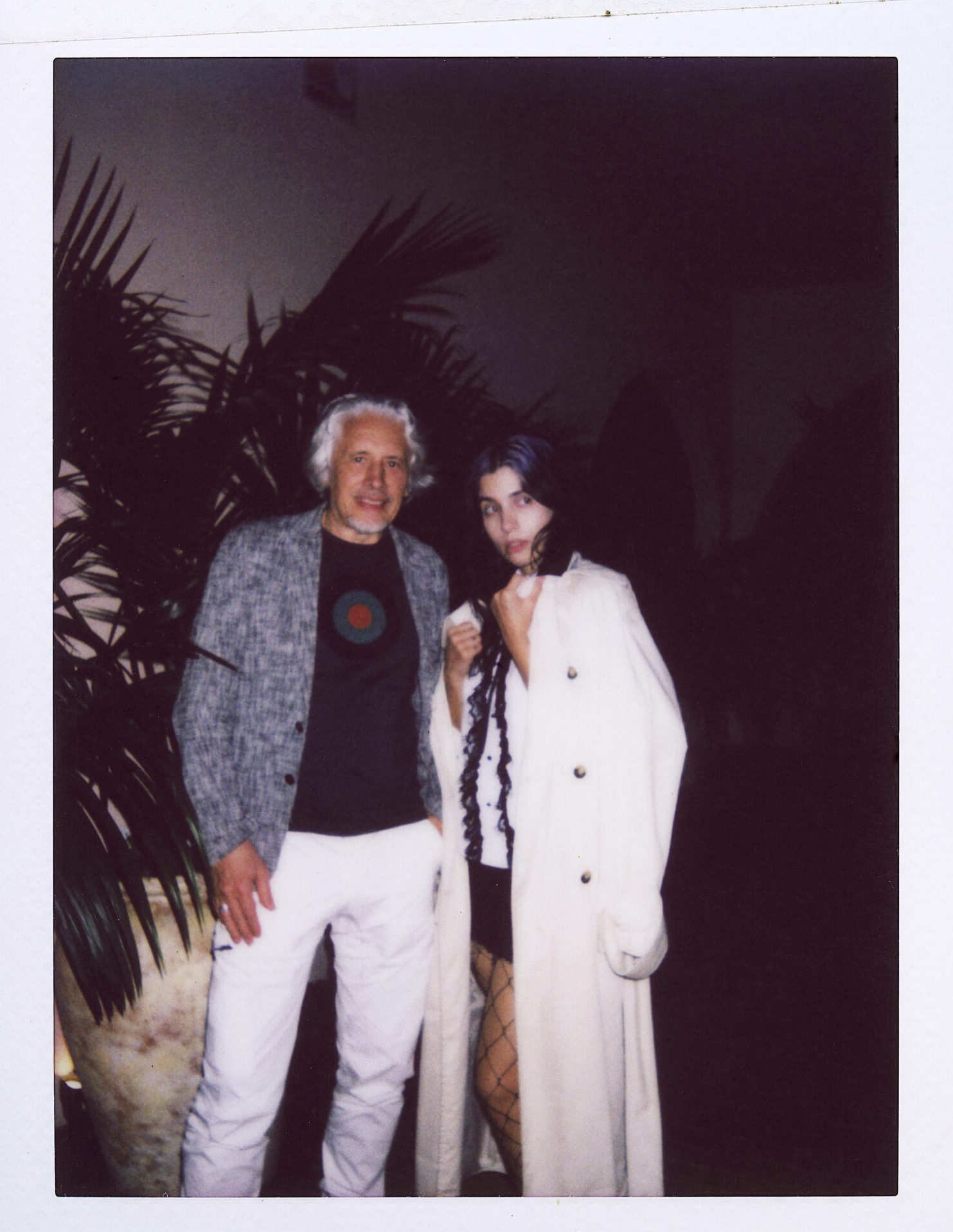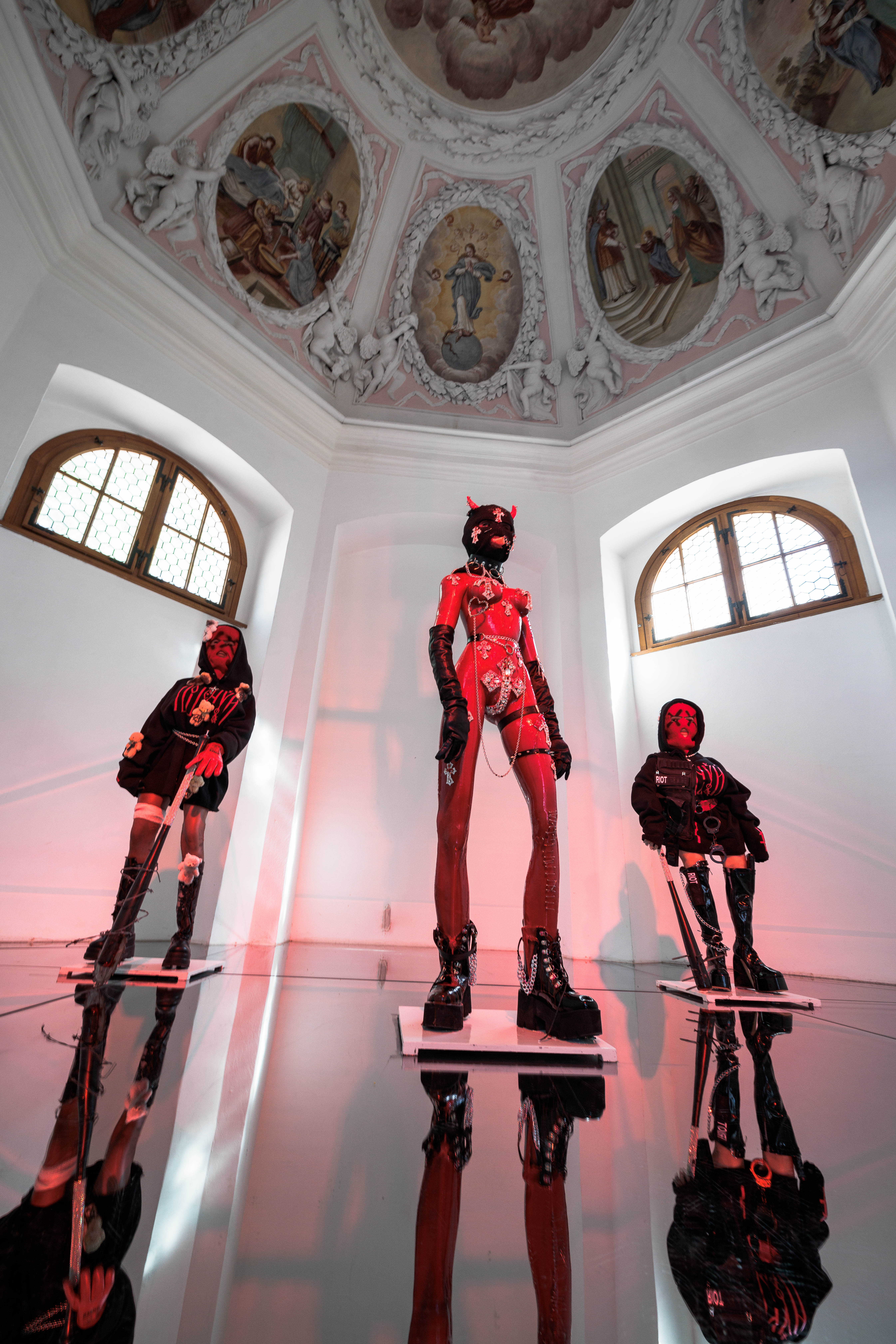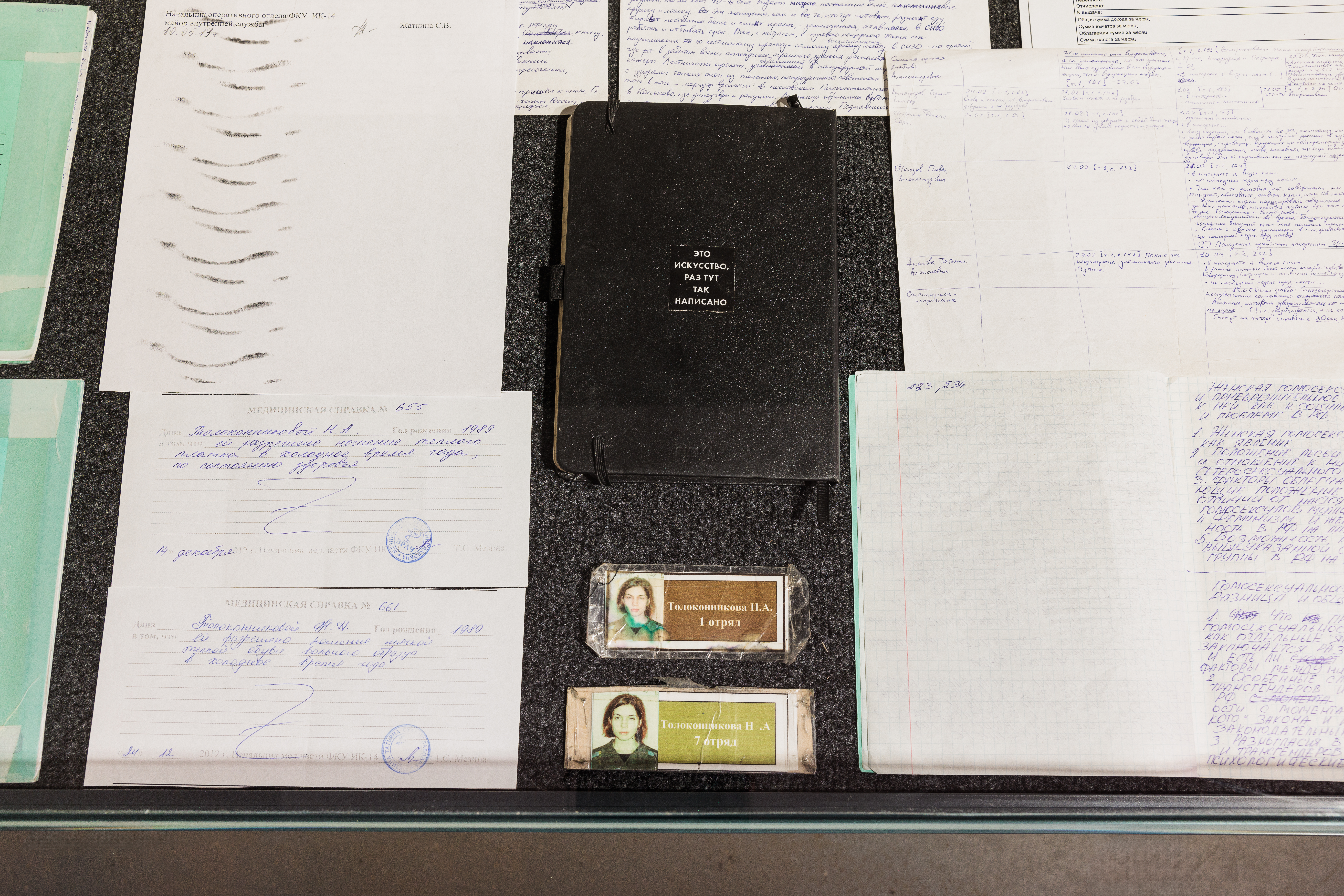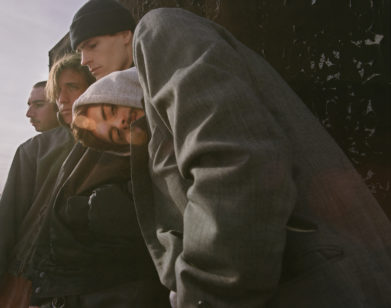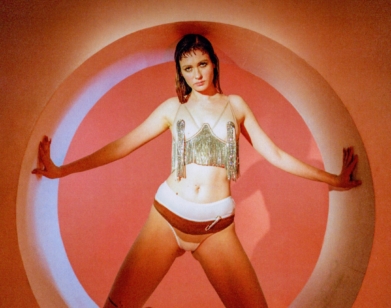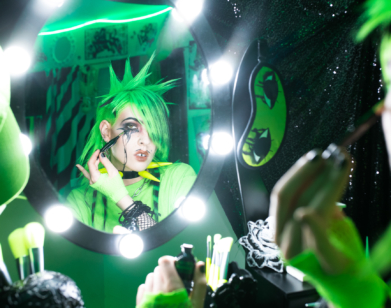IN CONVERSATION
Nadya Tolokonnikova Tells Vladimir Sorokin About Life Inside a Russian Prison
When Nadya Tolokonnikova was 22, “the spirit of oprichnina” was already making its way through the capital of Russia. She formed Pussy Riot, a Riot grrrl-esque punk performance art group, in 2011, the year before Vladimir Putin’s administration sentenced her to two years in prison for “hooliganism motivated by religious hatred,” a vindictive response to a Pussy Riot performance-protest held in a Russian Orthodox church in Moscow. When Tolokonnikova and her bandmate were granted political amnesty in 2014, it was believed to be Putin’s olive branch to the Winter Olympics committee. Fast forward to today, and here’s “pretty much the situation,” as fellow iconoclast Vladimir Sorokin, one of Russia’s most famous and provocative living novelists, puts it. “A completely unimaginable symbiosis with the USSR, with Tsarist Russia, with the oprichnina and the wild 90s,” he continued. “A dragon with many heads made up of different eras–such a grotesque beast.”
But for a moment in the ‘90s, things were almost good. So when did Moscow freeze over? Dating back to “the defeat of NTV and [Mikhail] Khodorkovsky’s imprisonment,” Sorokin explains, “the pendulum was swinging to the right.” But he couldn’t have anticipated just how violent and repressive the State would become. “The only thing I didn’t expect was that all this would end in a war with Ukraine,” he says. Tolokonnikova concurs: “I didn’t believe it until the last minute.” Last month—to commemorate Tolokonnikova’s debut solo exhibition, Rage, at OK Linz in Austria, and the forthcoming reissue of Sorokin’s The Norm—the pair got together on Zoom for a wide-ranging conversation, translated from Russian by Max Lawton, about literature, censorship, activism, and making art in a time of war. Along the way, Tolokonnikova told Sorokin about her experience in prison, which involved “a beautiful, full-fledged, real romance” with the woman assigned to cut her down to size. After all, Sorokin adds, “it’s always in the places where the most severe pressure exists that these feelings break through.”—EMMA STOUT
———
NADYA TOLOKONNIKOVA: I think this is the first time I’ve ever seen you smoke. It’s very nice. It suits you.
VLADIMIR SOROKIN: I don’t smoke regularly at all, just when I feel like it. I have a few existential questions for you, but I’ll ask them later.
TOLOKONNIKOVA: I had an interesting conversation with a girl who lives in Russia, a girl I’m still very close to. I won’t name her because even just naming a Russian person in public puts them in danger. But she’s now 23. And she told me that she had just recently read The Norm for the first time and was basically lamenting that she hadn’t read it back when she was 19. I asked, “What difference does it make?” She said, “If I’d read it at 19, then I would’ve been much more relaxed and free when talking about art. It would have allowed me to speak with more confidence, it would have liberated me.” Then I asked, “Do you think it’s too late for all that at 23?” And she said yes.
SOROKIN: Well, I have to say, I read Ulysses quite late. I mean, I’d written The Norm before I read Ulysses.
TOLOKONNIKOVA: I really wish I had The Norm when I was in prison, but they’re pretty obsessive about not letting books like that in. My jail was also stricter than a regular one. They had such bad literary taste—most of the books they let through were impossible to read. Because of that, I had to read the Bible. But I read The Norm back when I was 13 or 14. I’ve talked about it so much, probably in almost every interview I do. And when people ask me, “How did you become the way you are, how did you get so crazy?” I tell them, “It’s all because of The Norm.” I think I set a trend among young people in Russia. That’s probably why the girl was telling me that 23 was too late. Without meaning to, I made people think of The Norm as children’s literature, all because my parents let me read it so young.
SOROKIN: Well, as the author, I can say that I don’t mind at all. My daughter read The Idiot when she was 12 years old. Nobody told her to. “Why not?” I thought. “Why not read The Idiot at 12 years old?”
TOLOKONNIKOVA: What did you read when you were 13, 14? What made the incredibly explosive impression The Norm made on me on you back when you were young?
SOROKIN: I read One Thousand and One Nights and H.G. Wells. We had a collection of Wells in several volumes. I read him pretty early on and what I remember is the visual aspect of his work. From childhood onwards, very early, what I liked was fantasizing and seeing pictures when I read, visualizing things. I stuttered as a child, and my parents enrolled me in a special kindergarten where I’d get speech therapy five days a week. Midday naps were mandatory for some reason, but I wouldn’t fall asleep—I’d fantasize instead. These fantasies had a kind of erotic flavor and were accompanied by an erection. The teacher really didn’t like this and she once told me that if I didn’t go to sleep, she’d cut off my little boner. Beyond that, also quite early on, I picked up Gogol and read his collected works. I loved literature that was nice to look at in my mind. Like what Nabokov said, “I wanted to turn the reader into a spectator.” Both Wells and Gogol produced texts with fantastic visual elements. All of my peers were reading things like Thomas Mayne Reid. I tried that, but the pictures I’d get from him were just sort of gray. What I loved was literature that was visually striking. What about you?
TOLOKONNIKOVA: Asimov and Bradbury. Do you like that kind of thing?
SOROKIN: Well, that was later, wasn’t it? Bradbury, yeah, I was into that.
TOLOKONNIKOVA: I didn’t allow myself to read much for fun because I’ve been very hard on myself ever since I was a kid. I always thought that I had to study before I did anything else. And to study meant to follow the school program or maybe to read history books, some non-fiction. Even so, I’d sometimes have these breakthroughs when I let myself read. This is back when I was a teenager, so we’re talking about a very adolescent form of fiction. I’d let myself read Bradbury and Asimov on vacation, which means I know what you’re talking about when you say that writers like this paint pictures that change you forever.
SOROKIN: Yes. But after that, I was quickly immersed in the great Russian classics. That’s largely thanks to my father who loved Russian literature. Turgenev, for example. I grew up in a family of hunters and we went to visit my grandfather every summer, he was a forester in the Kaluga region. This is where my knowledge of the Russian countryside and of the Russian village comes from, the ways of peasant life as well—much like Turgenev’s. A Sportsman’s Sketches, I read that very early too. That book immediately drew me in, then continued to follow me for a long time. And Gogol, of course, then Tolstoy, Dostoevsky. Tell me, what Russian classics had a strong effect on you in your youth? Or maybe none of them did.
TOLOKONNIKOVA: I liked Dostoevsky the most out of everyone, but, unfortunately, school did a good job of killing what made him interesting. The only task the school program set out for itself was to make sure we read all of the classics, the big classics, but it killed everything in the process. Like, instead of really explaining why [Alexander] Pushkin was a breakthrough, including a political breakthrough, for his time, they just presented you with Pushkin’s cold corpse. A cold, cold corpse. And that’s why, when I came across literature that was contemporary to me, when I first discovered [Dmitri] Prigov and your texts, I realized that literature can be really interesting, it can really delve into something that has to do with me. I remember the first time I heard Dmitri Alexandrovich read; I was lucky, he came to Norilsk, and there was some kind of festival of contemporary culture organized by Irina Prokhorova, who took her idiot brother’s money and used it to promote culture. And she invited Prigov, who read Pushkin to us in the style of a Buddhist mantra, in the style of an imam, and in the style of a prayer. I was so shocked by this because I realized how easy it was to revive the cold corpse of the classics with a very simple gesture. After that, I began to look at Pushkin differently, and I developed great affection for Prigov too, of course. I began to study him very closely. That’s why it was important for me to come into contact with contemporary literature for the first time—to come into contact with conceptualism. It was a way of “cleaning off my lenses.” Then I finished school, moved to Moscow, and I didn’t have time to read at all. I mean, I read, I studied at the philosophy department and we read Plato there, everything that you’re supposed to read in the philosophy department. The next time I managed to immerse myself in literature was the Moscow pre-trial detention center. I was 22, and The Idiot made a terribly strong impression on me. I identified a great deal with the main character. In prison, I felt pretty much the way he did because he was so very polite and explained everything to everyone. They’d say to me, “Why do you want to destroy Russia? Are you a witch?” And, like Prince Myshkin, I’d explain to them politely that, no, this is art. I don’t want to destroy Russia; I want the best for Russia. I’d explain this to them every time, very kindly and a little bit idiotically. But it really worked.
SOROKIN: Yeah. Beyond that, our generation envies yours in certain respects. We couldn’t read Nabokov or even [Daniil] Kharms when we were that young. It simply wasn’t available.
TOLOKONNIKOVA: I read Kharms with my dad as a child, and [Velimir] Khlebnikov. And it made a very strong impression.
SOROKIN: I read Kharms when I was about 18, 19 years old. You said that he kind of cleaned your lenses of all the grease that school had smeared across them. It seems to me that, in Moscow, conceptualism was a big part of a very similar form of therapy. It opened the eyes of a great many people. Which is wonderful. I’m glad that it’s had an effect and I’m glad that I had a hand in that.
TOLOKONNIKOVA: After I had my lenses wiped clean with conceptualism, I realized that, in the context of Russia, Dostoevsky had suffered, Pushkin had suffered, Gogol had suffered, and everyone else had suffered. And I realized that, as it turns out, it wasn’t that the classics are against me—against us poor, unfortunate girls who had to read them and discuss them with brutal coldness at school. On the contrary, it’s school that is a repressive institution, that is the opposite of both me and the classics. The classics and I are playing on the same team. I had this realization fairly late. It was when I was in the house of the dead myself. I was sitting in the Moscow pre-trial detention center. I was reading The House of the Dead, and I was surprised that they never told us about it in school. Dostoevsky was almost killed for this, just for reading Belinsky’s letter to Gogol. And I think that’s the first thing I’ve communicated to young radical minds to get them interested in Dostoevsky. Our post-Soviet schools are so permeated with fear. They’re afraid to talk about anything political. I would think that, as it’s been 200 years, we might talk calmly about such things. But no, there’s still the same censorship. It kills all living things within these texts.
SOROKIN: There’s Russia, then there’s the machine that operates at its center—this pyramid of power. Quite early on, I felt this. It was unconscious at first. But then, when I read [Aleksandr] Solzhenitsyn, I became a convinced anti-Soviet. I began to perceive this power as a sort of natural disaster, a cloud hanging over us. From time to time, something comes out of it, falls onto our heads, and there’s nothing we can do about it. It’s not good for art. To participate in Soviet publishing, for example, was like allowing your leg to be cut off by a chainsaw. They all became voluntary cripples, they let censorship cut off their limbs. Soviet literature is, to put it generally, a ballet of cripples. And the further we are from the USSR, the uglier it comes to seem.
TOLOKONNIKOVA: Many people say that Putin is restoring the USSR, and he’s already said that the main geopolitical catastrophe of our era is the collapse of the Soviet Union. Do you see any continuity in today’s Russia from the USSR?
SOROKIN: Well that’s pretty much the situation right now: a completely unimaginable symbiosis with the USSR, with Tsarist Russia, with the oprichnina and the wild 90s. A dragon with many heads made up of different eras—such a grotesque beast. It’s awe-inspiring too, of course. But this dragon won’t manage to live for long—maybe if we were a small state like North Korea. But in Russia, it’s just not possible for it to live for a long time. I don’t believe that the USSR 2.0 will happen.
TOLOKONNIKOVA: As a person who did not successfully evade arrest, I wondered how you writers and artists in the underground in the Soviet Union managed to avoid arrest. After all, we know that you could have been imprisoned for samizdat or for publishing in the West. But how did you balance on that edge?
SOROKIN: How come we didn’t go to jail? If Perestroika hadn’t begun, we’d have gone to jail. All of us. Even before Perestroika had actually begun, there was a general odor of Perestroika, and the state-security apparati felt it as well. But I gave Rozanova permission to publish The Queue in ’84, back when there was no odor of Perestroika whatsoever. It was a very gloomy year. But the desire to publish my first novel uncensored was such a strong drug that I couldn’t bring myself to think about anything else. And this caused some issues—they had a little bit of a go at me, KGB guys did. But they realized that the country was turning in the other direction. In fact, one more year passed, then the whole thing fell apart. We were lucky with Mikhail Sergeyevich [Gorbachev]—he started the whole process in ’85. If he hadn’t, we probably wouldn’t be talking now. Or would we?
TOLOKONNIKOVA: I never lived in the Soviet Union, I was born in 1989, but it seems to me that, in the Soviet Union, the rules were a bit more clearly outlined. In Putin’s Russia, the authorities are constantly escalating, and you never know what you will be arrested for. Maybe that’s why your underground could survive: because the authorities were already somewhat more stable and the rules were more or less known.
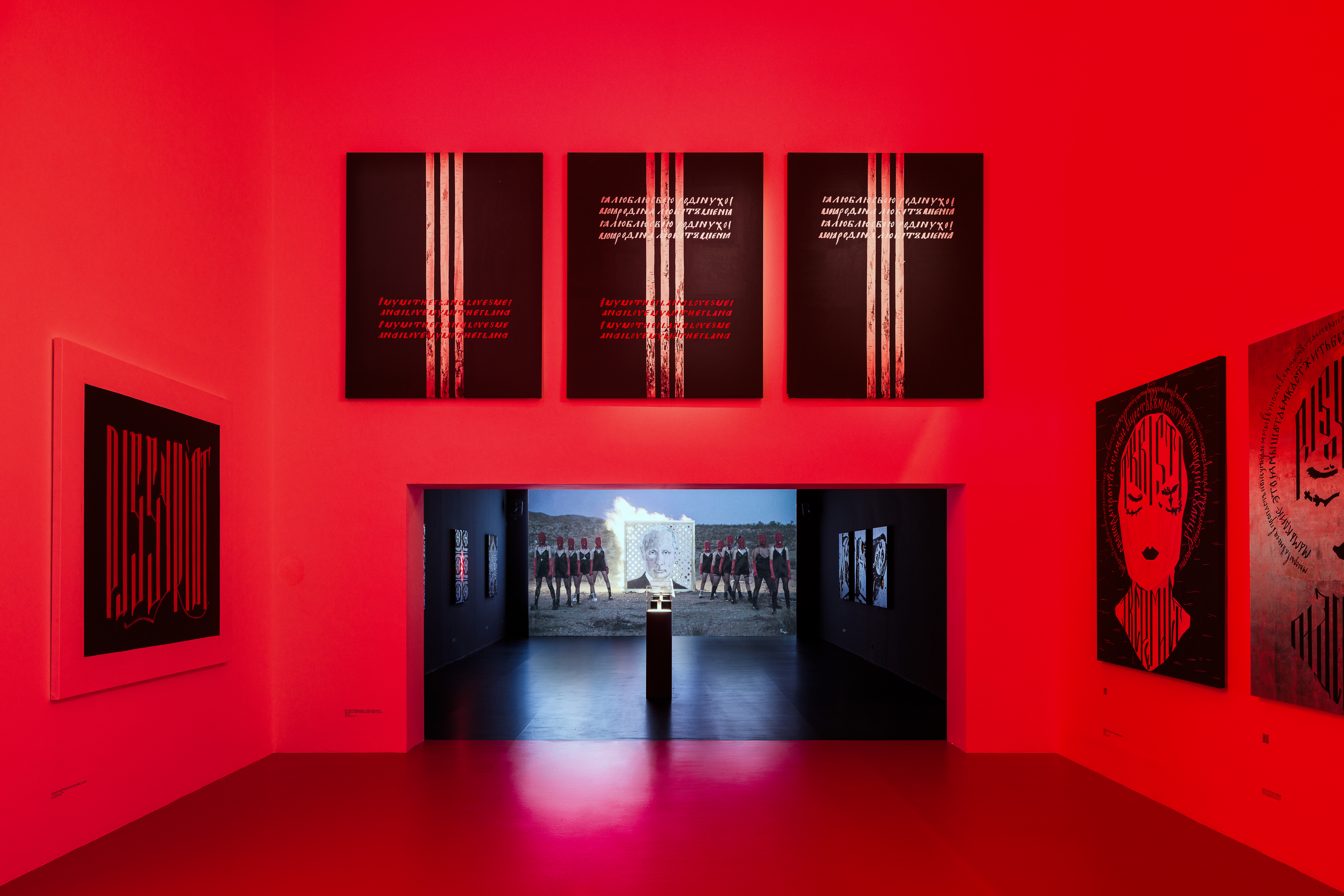
MY MOTHERLAND LOVES ME AND I LOVE MY MOTHERLAND. Photo courtesy of Nadya Tolokoonnikova and OK Linz.
SOROKIN: I’d say it was more because the Soviet Union was already dying for real. Clearly, it was a system built by Stalin for his own gain. And, as soon as he left, it gradually began to fall apart. First there was alcoholism, then some marasmus and stagnation—then the actual death throes set in. When an empire like that crumbles, it makes an impression. I’m happy that I got to live through those unforgettable years.
TOLOKONNIKOVA: I envy you in that sense. I’d love to have seen Perestroika, too. I remember the ‘90s very well. And I have a very happy impression of them because I was a child and, of course, was shielded from any financial problems. But, on the other hand, this feeling of freedom was also passed on to me. How were the ‘90s for you?
SOROKIN: Those were great years. But there was a lot of wildness too. People who relied on the Soviet system also existed and it was a disaster for them. But for creative people, it was a time of pure happiness. We were like a genie let out of a bottle. I remember my first trip. It was to West Berlin by train. And so much culture started to come out in the ‘90s. All the banned books, movies, music—it all came out. For people of culture, it was paradise.
TOLOKONNIKOVA: When did you feel that freedom was coming to an end? The first sense of it.
SOROKIN: Probably the shuttering of NTV. It became clear that the new authorities were taking control of the mass media.
TOLOKONNIKOVA: Were you watching TV or just following what was going on?
SOROKIN: I was watching TV of course, yes. Television was very important back then. In the ’90s, it was the main language of social communication. Then came the defeat of NTV and [Mikhail] Khodorkovsky’s imprisonment, which signified that there was a reaction to the freedoms afforded by the fall of the Soviet system—that the pendulum was swinging to the right. But then everything actually swung even further to the right. It was then that I sensed the spirit of oprichnina. I was certain that something like it would somehow appear. The only thing I didn’t expect was that all this would end in a war with Ukraine.
TOLOKONNIKOVA: Yeah, I didn’t believe it ’til the last minute, either. In 2008, our collective Voina did an action to weld the doors of Oprichnik [a restaurant owned by right-wing propagandist Mikhail Leontyev] shut with sheets of iron. I was there.
SOROKIN: Yeah. They told me that the Oprichnik restaurant had opened, and we went with some friends to check the place out. I remember a lot of chains and wolf skins. It was old Russian cuisine, not bad at all. And I don’t think it had windows. That’s what I remember. In a separate room, in the basement, there were some young people hanging out. But I realized that these weren’t just young people, they were siloviki. And you could sense that, as it were, they were convinced that their time had come. And what happened with welding the place shut?
TOLOKONNIKOVA: We brought iron sheets, we’d learned to weld for a month before that. So we were able to do it quickly. Five minutes after that, two cars with tinted windows appeared and six young guys with heavy iron bars jumped out of them. But we were already long gone.
SOROKIN: After that, I know that the restaurant did indeed close.
TOLOKONNIKOVA: Yes, we managed to close it down. Another question: how do you find the strength to live during the war, to do important things?
SOROKIN: It’s hard. Because the war is everywhere, I’m constantly reading dispatches from the front. For a year, I couldn’t write anything at all. But then it became clear that I had to do my own thing. I’m writing a new novel now. War, of course, is such a black hole of energy, it’s hard to create anything around it because it’s such a monster. But creativity helps you to survive. You work and paint, too, don’t you?
TOLOKONNIKOVA: Yes, but even working seems to be controversial. When I had the exhibition, I talked to a lot of journalists, and the most painful questions for me were about how art can really change things. I never had an answer to that question. At first I tried to make something up, to conjure an answer up out of thin air. Then I just let my irritation get the best of me and started saying, “I don’t know. I’m just doing a pointless thing that I enjoy. I don’t know if it will make a difference or not.” You probably get asked that question a lot too. What’s your answer? How can art change anything? It can’t stop a bullet, I guess. In that sense, of course, creation is pointless.
SOROKIN: But if a bullet hits a thick book, it gets stuck in it. And what about Russian literature? Are we to condemn it for the fact that it didn’t stop the wars, or the Bolshevik coup, or the violence of ’37? It seems to me that, in principle, this is not the task of literature. Literature is a living thing—it’s personal. I have some personal questions for you, too. Prisons are, of course, a very harsh and potentially important experience. How common was it for women to have relationships in jail?
TOLOKONNIKOVA: It was common, of course. I realized that people are much more bisexual and sexually fluid than they want to imagine—the people of Russia too, even though their government is very homophobic. I saw that women really want to love each other, and they love each other very sincerely. A lot of people on the outside think that they have nowhere else to put their libido, so that’s why it happens. But no, I’ve talked to a lot of women who don’t want to go back to men after their time in jail. The love of their life is a woman—that’s it, they’re not straight after all. Which really got me thinking about heterosexual propaganda in Russia. I think I fell victim to heterosexual propaganda. Because my very first sexual fantasies, which started quite early, were all about women. My first dream—and, by the way, I think I came during this dream—was an unforgettable experience: there was another girl with a super long fingernail touching my clit through the damp fabric of my panties. But in principal, I wasn’t against men either. I think I’m basically a sexual punk. Because in society, as it was built, especially in Norilsk, it wasn’t acceptable for girls to go with girls. So I got into heterosexuality, so to speak. But then, later, I had some very strong crushes. In jail, my love didn’t last for long, unfortunately, because she was punished for having an affair with me. That being said, she was originally assigned by the prison authorities themselves to cut me down to size and defang me. So she had to tell me not to say anything bad about the jail. Well, I didn’t listen to her and kept talking about human-rights violations. She ended up being punished because she couldn’t fulfill her main mission, which was to shut me up. So our romance was over very quickly.
SOROKIN: But in jail, can you sleep in your beloved’s bed at night?
TOLOKONNIKOVA: This girl and I were in different parts of the prison. Even within the same jail, there can be sections with varying degrees of severity. And, as a hardcore offender, I was put in a particularly strict section. You couldn’t get up in the middle of the night—I mean, you could go to the bathroom, maybe get a drink of water, but that was it. You’re watched very closely. But in the same prison, other women could sleep with each other with no problem. And I was in the prison in Mordovia, which, historically speaking, was intended for political prisoners. This is very symbolic. And not by chance, of course, because the Perm Krai and Mordovia were historically the where political prisoners were sent in the Soviet Union. So, it’s difficult in the jails there. When I talked to girls from other prisons, I learned that they were able to spend the night in the beds of their lovers. Not that they weren’t faced with certain limitations. Officially, a relationship with another inmate is a major disorderly conduct offense. So if you do it, you’re on the hook. You have to perform some kind of favor for the prison administration in return. As a rule, people who have the right to have sex in prison are snitches. Not always, but often they’re working for the administration.
SOROKIN: Perhaps you wonder why I’m asking this? Because we grew up in Soviet society, where sexuality from kindergarten on is suppressed at every level. There were no clubs, much less brothels, not like where Tolstoy and Chekhov lost their virginities at the age of 14 or 15, taken to them by their brothers as a pre-condition for the entirely healthy sexual lives they would end up leading. The state squeezed our sexuality into dirty back alleys that smelled of urine. You could hook up there. You could masturbate too, actually. So, I wondered how it would be in prison. You say that you became bisexual there.
TOLOKONNIKOVA: I felt it before, but it was in prison that I finally acted on it. You could really seriously fall in love, lose your head, and it would be with a woman.
SOROKIN: Paradoxically, it’s always in the places where the most severe pressure exists that these feelings break through. It seems to me that the reason the Soviet system collapsed is because, in a final accounting, man is a mighty cosmic creature. Turning him into some mechanical part of a tank or a tractor didn’t work, and neither the Gulag nor general repression helped the Soviets to accomplish this. This nightly moaning in women’s prisons is an illustration of this victory—the victory of humankind. We can’t be crushed after all.
TOLOKONNIKOVA: No.
SOROKIN: And thank god.
TOLOKONNIKOVA: I agree. And I saw a great human victory in the fact that the woman I had a fling with, despite the fact that she was initially hired by the administration to cut me down to size, developed some very warm feelings towards me. She started reading my magazines, then she started getting political literature from somewhere, then she read a bit about Patriarch Kirill and the Russian Orthodox Church and Putin. She began to tell me things that I didn’t realize and didn’t know. We even had kitties. We were together for a few weeks, but it was a beautiful, full-fledged, real romance. She rescued the kitties, because terrible things were being done to them. They used to burn them in the oven in our prison. So she kept them under her desk and hid them from the administration. We’d go underneath her desk and kiss them.
SOROKIN: Nadya, you need to make a movie about this. A love story like that in a Russian prison. No one’s done it. Invite me to the premiere.

